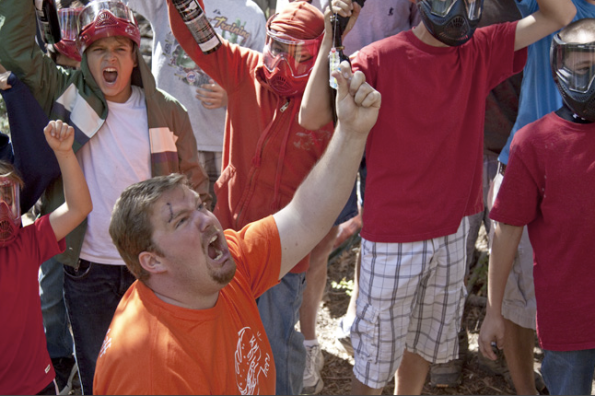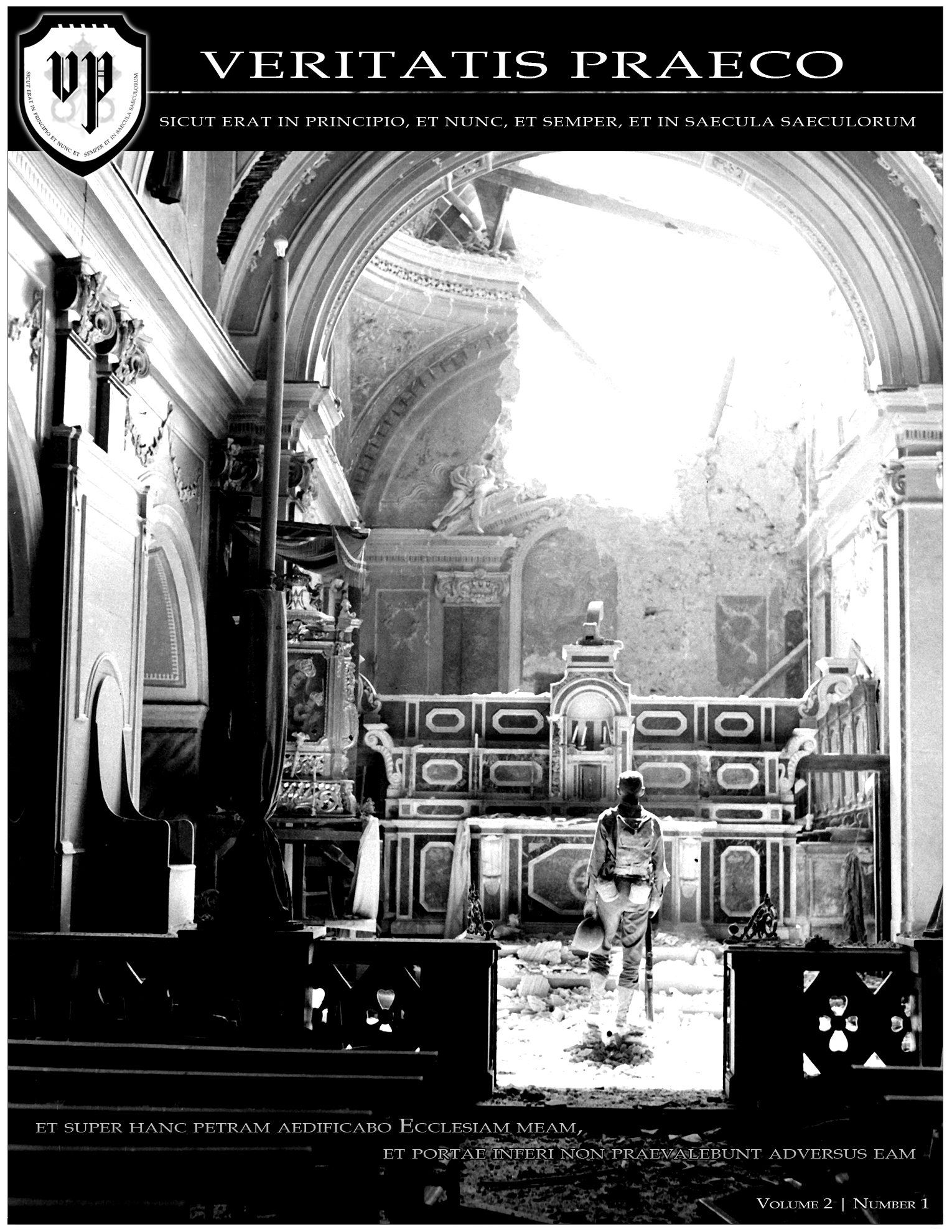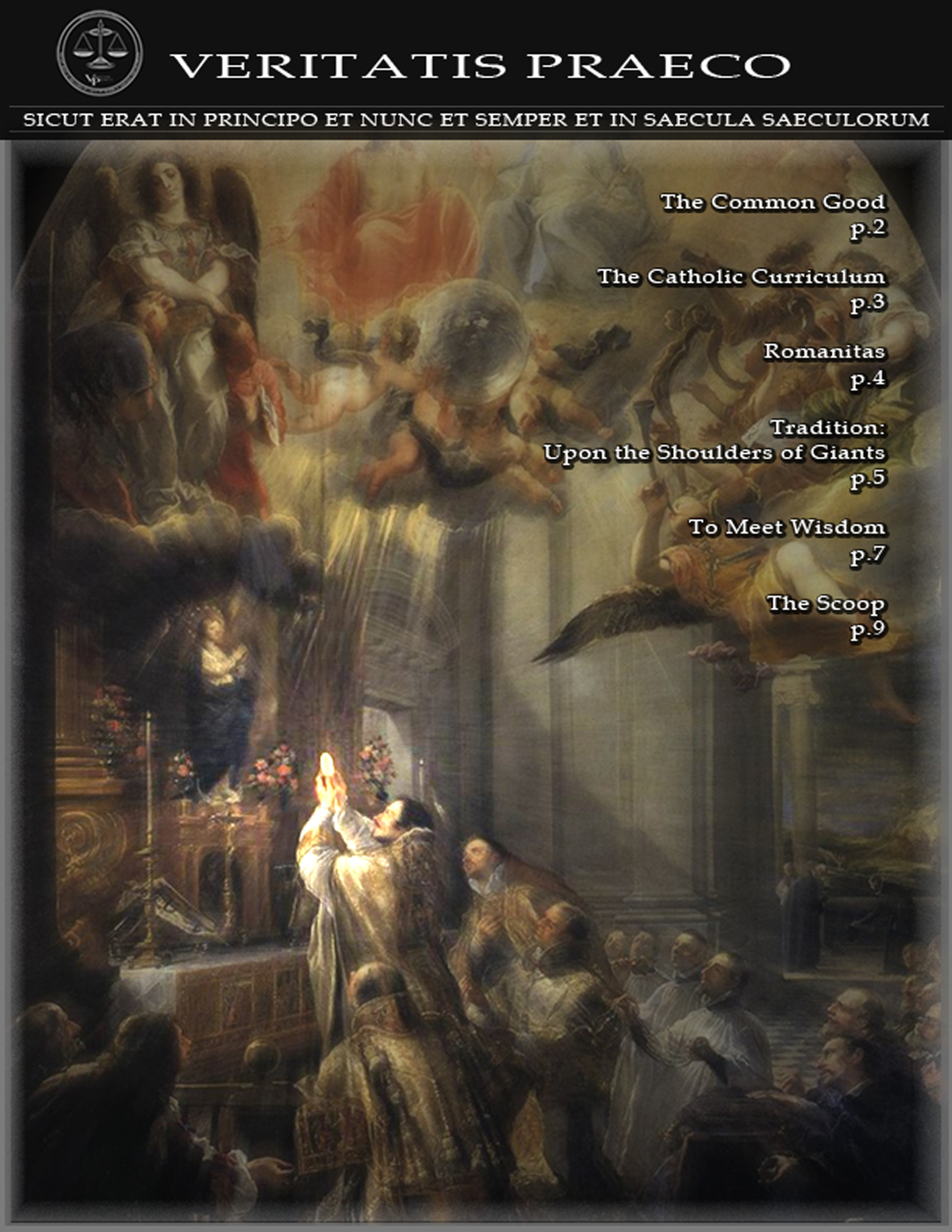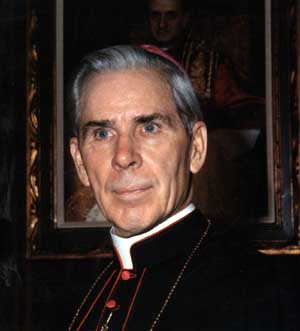Archive
The Role of Academics in the Secularization of the Church
“The phrase ‘Dominus vobiscum,’ which is used so often in the Mass, is translated into English as the subjunctive expression ‘the Lord be with you.’ One might imagine that there is an implicit word ‘may’ at the beginning to express that this is only a wish, a desire of the speaker, that God be with the person whom He is addressing; in our case, the Priest wishes this upon those hearing his Mass. But nothing about ‘Dominus vobiscum’ requires that it be taken in the subjunctive; nothing contained within the words themselves suggests that they are only a wish. It would almost seem more logical to interpret the phrase as being declarative, as stating ‘the Lord is with you.’ After all, only three ideas are contained in the words of this expression: Dominus (God), vobis (pl. you) and, –cum (with); none of them are ‘wish’ or ‘hope’ or the like. In fact, if you ever did want to communicate declaratively to someone that the Lord is with him, the Latin would be the same. The point is that translation obviously is not simply a matter of finding the word in one language which is the same as the word in another, it is about capturing the meaning of the words, something which oftentimes requires more insight than the simple knowledge of a text. And here the meaning of the words is inseparable from what is intended by the Church.
“But recently, allegedly Catholic scholars and theologians have cast ominous shadows of doubt over the Church’s ability to interpret, not only the texts of the Mass, but of the Bible as well. These people hold up awkward interpretations of ancient texts as the basis for their rebellion, and are for that very reason trusted and followed. These people, these so-called scholars of modernity who play on people’s trust, seem to form the foundation upon which modern liturgical and theological abuse is built. Although none of it could have gotten anywhere without weaknesses speckled here and there throughout the Church, the fact of the matter seems to be that even the clerics who played into modernity’s hands could not have done as they did without the help offered by corrupt Biblical interpretation.
“The most major phenomenon that this tactic makes use of is people’s tendency to accept an interpretation outside of the context of the Church’s tradition simply because it is linguistically valid. Also, people seem to be easy to convince that a text’s true translation must be any other than that taught by the Church. So, for someone who has already rejected the authority of the Roman Church, or for someone who is looking for a reason to do so, a bad interpretation or translation of a text—not simply a bad idea—will push them over the edge from speculation or disagreement into formal heresy. As long as they have a script to point to and say, ‘There, that’s the basis for my belief’ they feel reassured that theirinterpretation is correct. Without this, Christian heresies and modern abuses would only stand on the foundation of the charisma of their founder, and would therefore fizzle out like most cults do, when the leader dies.
“Every Christian heretic has done this, everyone who leads people away from the Catholic Church must not only devise a corruption of Her teaching, but they must also base this on a text which the people will willingly accept as valid, most often, this is done with the Bible; other times with apocryphal texts as with the recent DaVinci code craze, or, less frequently, with made-up texts, such as the book of Mormon. To simply approach a Catholic and tell him, that the Bible is not and never was the inerrant word of God would be too much of a shock to him. It would be far too hard to entice people with such a harsh message. It would be much more convincing to approach them and tell them that the Bible is all good and true, but that we’ve just been misunderstanding it all this time, and that liberation from Catholic oppression lies in the interpretation of a text that this person already holds dear. The words have always been there, it’s just that no one has found their real meaning until now.
“Now, this is easy enough to do in English; modern protestants do it all the time. Take for instance the passage in which Christ gives the Keys to the kingdom of heaven to Peter. Protestants don’t reject this as the establishment of the Papacy because Luther or anyone else told them to; they reject it because they believe that people like Luther have shown them the true way to read that particular part of the Bible. They believe that the truth is in the words, not in some person who tells them to read it a certain way. This is similar to telling a child that when the hands on the clock are at the 12 and the 8 that he has to go to bed; instead of simply telling him to go to bed at 8:00. By apparently removing the authority from your hands, your message is received as truth more readily.
“But there is really a limited range of meanings that one might be able to draw from any given English Bible passage. No one could argue convincingly, for instance, that Christ didn’t actually present Peter with keys, but that they were summer sausages instead. No one could do this because English is spoken today and we all know that the letters ‘k-e-y-s’ could never mean ‘summer sausage.’ But, if you were dealing with a dead, ancient language, the general population would have no idea what the squiggles on the page meant and without trust in the authority of the Catholic Church could wind up convinced of whatever interpretation was argued most passionately. Perhaps the best illustration of this phenomenon is the recent ‘discovery’ that Muslim heaven is actually a storehouse for white grapes instead of virgins. Here you have a situation where an alleged translation of a few words on a page is presented in contradiction to right reason, tradition (albeit Muslim tradition), and even some elements of psychology, and people bought it simply because the words were there. For hundreds of years the world has heard, from countless secondary sources and oral tradition, that the Muslim idea of a heavenly reward consists of a sensual gratification; that is, somewhere around 70 virgins awaited every Muslim male who made it to heaven. But in 2006, the truth was finally unveiled! The words said ‘white grapes’ not ‘virgins!’ All of the Saracens of history had been deceived, and we now know the truth, all thanks to a translation error that has finally been cleared up! There is no need for me to go into much more detail about how ridiculous this is. And yet, people will believe it because, as the Muslims say, it is written. And people use this exact same approach to justify the most outlandish interpretations of Biblical texts today, by going back to the Hebrew and discovering new ways of interpreting texts whose meaning has been understood and agreed upon for millennia.
“Hebrew is a language that lends itself to vagueness and allegory. Many words have a range of meanings, and it takes a great deal of scholarship, but most especially the guiding hand of providence, to ensure the proper translation of a Biblical text written in Hebrew. And because of this fact, it has recently become the language of choice for rogue scholars and theologians to use as a tool to attempt to insert their own ideas into the fold of Catholic thought and even Catholic dogma. This tactic has caused people to believe, for instance, that there is a serious basis for disbelief in the virgin birth, because the Hebrew word used in prophecies of the Blessed Virgin Mary can be translated simply as ‘young woman’ and do not explicitly say ‘virgin.’ Despite the fact that the Septuagint translates this as ‘virgin’ and the fact that it is the tradition and teaching of the Church to understand the implication of ‘young woman’ to mean unmarried and therefore a virgin, people still are shedding their trust in Catholic teaching because of these few pseudo-intellectual ‘scholars’ who can point them to a misinterpretation of a text.
“As I said, we can only have gotten where we are today as a result of a combination of factors. These are: bad ideas, an ancient textual basis for belief in these bad ideas, and a scholarly source to point to as the reason why the text should be interpreted in such a way. And I believe that this last category, the ‘scholars’ of the modern universities, stand behind these radical interpretations and act as their driving force, as the foundation atop of which is built the wrecking-ball of modernity within the Catholic Church. Bad scholarship can do unfathomable amounts of damage and even, in this case, wreak spiritual havoc. For this reason, I would like to remind the students of Southern Catholic of the potential power that they wield. Although Southern Catholic [was very small and is no more] it nonetheless initiated all of its students into this very same world of academia on whose authority countless false doctrines have been spread. Schools such as Southern Catholic perform the indispensable duty of leading their students out of ignorance and showing them their nature. And it is only after having done this that an individual can hope to enter the world of greater academia (graduate school and beyond) equipped with the knowledge and abilities necessary to combat modernity at its very heart. All too often it seems like the choice to pursue a lifestyle in academia is portrayed as self-serving or useless in a practical sense, but I think that nothing could possibly be further from the truth. It seems to me that the role of the Catholic Scholar is in fact amongst the most significant in the fight against modernity, and that without them, the secular universities would be able to turn scholarship into a weapon that couldn’t be defended against.”
Ω
A Great Day for Justice
United States Senator Dianne Feinstein, upon hearing the announcement yesterday that Sonia Sotomayor would be the 111th person to sit on the supreme court, proclaimed: “It’s truly a great day for the United States of America. A great day for justice and the law.” Now, maybe it’s just because I’m just a bitter, headstrong conservative, but this comment really eats at me. Senator Feinstein talks about justice being brought about, but I wonder what she means by that. What does someone so far left think that justice really is?
I would have to insist that no real conception of justice could exclude an idea of human nature. Since justice must lead to a proper treatment of human beings in accordance with the dignity that they deserve, one could not have the faintest clue of that that proper treatment would include unless they had a rather firm grasp on human nature. Now, I would like to make a rather rash suggestion. So called progressive modernists such as Senator Feinstein, and Justice Sotomayor, by virtue of the principles inherent to their worldviews, have denied the existence of human nature and are thereby incapable of consistently enacting justice. I’m not simply trying to bash liberalism here, but it does genuinely appear that when the idea of human nature is removed, that justice becomes impossible, and that the only place that we see a persisting notion of human nature is in the idea of conservatism as enshrined in the Western tradition.

Sotomayor & Feinstein
The idea of conservatism is a member of a somewhat unusual breed of concepts. Like every other word it carries both denotative and connotative implications, but it appears to be unique in that, somewhere in the course of recent history, its denotative meaning seems to have gotten lost. Because of this disconnect from its actual definition, it has taken on a very vague meaning and is used typically to refer to anyone who resists the notion of “progress” suggested by modernity. A conservative is someone who reminisces about how great things used to be and who, on the whole, resists change. This is not just a definition imposed upon conservatives by their adversaries either; most conservatives themselves are not quite sure what it is that they’re conserving. They just know that in their day, marriage was between a man and a woman, government was small, abortion was illegal, and that’s the way it should stay. But conservatism is not just an abstract clump of crotchety opinions, it’s about the principles from which those opinions derive, and that is an understanding of human nature a real and concrete thing which must be treated as such.
Maybe an analogy would help. Trying to understand and treat human beings in accordance with their nature is somewhat like understanding and treating a VCR in accordance with the parameters set out by its manual. We know that a VCR has a certain range of capacities and limitations and we know that it will operate best if we understand these capacities and treat it accordingly. To continue with the analogy, I would say that the conservative method of VCR use would be to plug it in to a wall socket which supplies the proper voltage and amperage, to feed it VHS tapes, and to connect its output plugs to their appropriate locations in the back of the TV. And only when you have treated the VCR in accordance with its intended purpose do you become the most free to watch movies on it; you accomplish its purpose, you enact VCR justice. Now consider a means of VCR usage which disregards its nature and defines VCR freedom as the ability to cram it full of peanuts and use it underwater. This sort of use is based on a concept of a kind of freedom, that is, it affords one the greatest number of possible uses of the VCR. For instance, under the conservative method of VCR use, one was limited to only a single kind of thing that he might put into it, that is, a VHS tape. But the secular humanist view, since there is no limit to the sorts of things that one could put into the cassette deck, the user experiences a greater amount of VCR freedom, right?
The point is that, in the sense in which progressives talk about it, the radical freedom espoused by Feinstein and Sotomayor is of course a type of freedom, their justice is a type of justice. It allows for the ability to do any of a variety of things: abortion, contraception, gay marriage, public healthcare, etc. But it allows this at the expense of the dignity which is intrinsically tied to human nature, and nothing which denies humans this dignity could ever be called just.
Accidentally Capturing the Zeitgeist
For the most part, a trip to the movies these days entails a downward voyage into a dark, musky pit of sound and fury which signifies nothing. That is, modern movies are, on the large, devoid of much real content. You enter the theater and have some emotion, be it fear, pity, lust, or excitement, elicited from you in a cathartic whirlwind which is not entirely unlike a drug, or a strange form of hypno-therapy. And somewhere in the midst of all of the gratuitous sex, violence, and special effects which are designed to toss your intellect somewhere into the recesses of the back of your brain, movie makers often try to insert witty quips or thematic elements which either advance some sort of progressive ideology, or attack institutions which uphold traditional understandings of morality, particularly the Catholic Church. In fact, I wouldn’t be all that surprised to find out that there is some sort of movie-making checklist which reads:
-Bad guys must be Russian or German
-Children can’t get hurt
-Good guys have to win
-Catholics must be slandered
But, despite their best efforts to express poorly-thought-out philosophies and produce a final product whose moral principles stand in the face of any traditional understanding of the human person, it seems like modern movie makers have actually given birth to an altogether beautiful thing.
When a writer sits down to construct a plot for a movie, before they have reached the stage in which they satisfy the four great tenants of filmmaking listed above, they must first chose a subject matter. The plot of a film must of course be interesting and attractive, and it is these very ideas of interesting and attractive that lead the moviemakers into their act of brilliance. What will people be attracted to? What will people want to watch? These are the kinds of questions that writers must ask themselves before choosing a subject matter, and in answering them they unwittingly capture an element of their era’s zeitgeist, a feat which will most likely be the greatest quality of their film, accomplished before pen is ever put to paper.
We haven’t seen any movies lately about aliens coming to enslave humanity, partially because it is not an issue with which Americans are greatly concerned, and particularly it is not something that we can relate to on any great level; it simply isn’t part of our zeitgeist. This was not true in the 1950’s when the idea of space travel was floating about for the first time and inspired such movies as: The Day the Earth Stood Still, War of the Worlds, Forbidden Planet, It Came from Outer Space, and It, the Terror From Beyond Space, to name a few. This interest in and concern with the idea of things greatly more intelligent and powerful than us possibly existing in the inky expanses of space was a sentiment that characterized the zeitgeist of the 50’s just as much as the fear of communism characterized the zeitgeist of the Cold War era.
What we do see in movies these days is what is immensely interesting. In the past ten years or so, movie screens have been filled with images depicting man’s enslavement by, not aliens this time, but technology. Films such as the Matrix trilogy and the more recent Eagle Eye showcase this fear very well. People feel an uneasiness about their reliance upon machinery because certain elements of technology seem to threaten one of the most crucial elements of human nature, freedom of the will, in a way very much like the little green men of the fifties.

Matrix Human Farm
Our soul is a composite of intellect and will, two things which must operate together, and anything that threatens the operation of the soul by subduing the will is as much a threat to human dignity as is physical violence. In fact, much in the same way as our nature makes use of the emotion “fear” in cases where physical violence is threatened as a means of maintaining safety, so also does human nature use fear to ensure the safety of the soul. And, ironically enough, it is this very fear, the fear of violence done to the soul, that movie makers play upon when they develop many modern films; while simultaneously discrediting its existence by ridiculing the institutions of religion which maintain it.
Cinema, despite largely having sunk to the level of a cheap thrill, seems actually to be able to tell us something about human nature that few other things can. A history book in the future may contain the phase “Americans in the early 21st century feared the encroachment of technology upon their lives” but it could not convey the zeitgeist as well as a fistful of films about the very same thing. This isn’t because a movie can convey sentiment more effectively than text, but it is because there is a kind of honesty inherent in the way that a movie expresses the zeitgeist. We are not talking about something that a filmmaker wrote into the script as an idea that he wanted to convey, we are talking about the fact that he wouldn’t make the movie if it wouldn’t sell, and in order to sell, it had to strike a chord with its audience; a chord that the moviemaker could not invent, but one that he would have to find.
A Catholic Alternative to Life Teen
Everyone knows about Life Teen. It has essentially become the only recognized “youth-oriented” function of the Catholic Church and exists in some form or another in every Diocese in the United States. Its growing ubiquity, however, has produced an interesting side effect; that is, that a parish’s lack of Life teen is seen as just that, a lack. A parish is hard pressed to reject a Life Teen program outright as it will face a charge of being distant from, or unconcerned with its youth. So, the absence of Life Teen in a parish is usually seen as something that “they just haven’t gotten to yet” or “they’ll get once they’re bigger.” Like it or not, it really seems to be a parish’s only option when it comes to catering to youngsters.
Enter Juventutem. An organization founded in May of 2006 who’s aim is to “foster the sanctification of the youths worldwide according to the Roman traditions of the Church.” Just this description alone is about the biggest breath of fresh air that I’ve gotten in a long time; there is actually a Catholic alternative to Life Teen! If you continue to read their mission statement and the other elements of their program, you find that they are about as well-grounded as one can be when it comes to programs aimed at youth. That is, they treat their involvement with the children as one aimed at bringing about a movement, a movement from the spiritual infancy in which such programs typically find their members, towards the kind of maturity that should be expected of catholic teenagers, and even adults. They have their members make such promises as weekly adoration and at least yearly attendance of a mass in the extraordinary form.
My purpose here is not to attack Life Teen, but I believe that in the interest of demonstrating just how unique Juventutem is in the world of Catholic youth programs it is interesting to compare the picture that either organization currently has on its homepage.

Juventutem's Homepage
And then there’s…this

Life Teen's Homepage
Now I know that pictures such as these are not exactly illustrative of the inherent differences between the two organizations, but it does provide a unique (and undeniably funny) glimpse into certain aspects of either group which words may not be able to convey, or at least that they do not convey, I’ll just leave it up to you to figure out exactly what that is.
Juventutem’s dedication to the Traditional Latin Mass may lead one to believe that they are more of an “old mass club” than they are a group dedicated to reaching out to the youth, but the point is that they could easily be used as the foundation of a youth program at any parish around the U.S. whish is seeking an alternative to the “charismatic” and “progressive” attitude which so characterizes Life Teen. In the same way that not everyone is devoted to the Old Rite, not everyone is devoted to drums and guitar solos during mass either. The exciting thing about Juventutem is that they allow pastors of conservative parishes to cater particularly to their youth without being pressured into using Life Teen for fear of having that dreaded “lack” of a youth program.
I understand that Juventutem does not portray themselves as an alternative to Life Teen, but we are in desparate times, and they fit the mold. Juventutem is principle driven and has an idea of formation which is other than “meeting them where they are,” it is based on principles which more resemble those of good parenting rather than those of a cool, young uncle who lets you stay up late and watch R-rated movies.
Fr. Maciel: The Essence of an Order
With all of the shock and scandal surrounding the rather recent discovery of Fr. Maciel’s duplicitous lifestyle floating around the news, it’s very easy to get yourself hooked on the individual details of his life. It’s almost like reading the end of a novel when the mysterious details of the main character’s personality are all laid out; his influences, his secrets, and in general those things which finally make sense of his actions. And though such news satisfies that part deep inside of us which longs to hear gossip and personal secrets, we would be doing the Legion, and more importantly, the Catholic Church, a disservice by dwelling on the details and not using them to support an understanding of the situation. And although our opinions as individuals don’t exactly matter in the long run, we owe it to our catholic culture to at least try to arrive at an idea of what justice would be in this particular situation. Especially in this interim period while the Vatican is still deliberating over the details of the order’s re-founding.
Rather than try to put all of the pieces together ourselves, let’s begin by looking at the course of action that the Legion is itself suggesting.
According to a Catholic news site :
“Fr. Scott Reilly, LC, Territorial Director in Atlanta, Georgia, announced to all those who work in the Territorial Direction of the Legion of Christ, that Marcial Maciel had a mistress, fathered at least one child, and lived a double life. For this reason, the Legion is renouncing him as their spiritual founder.” [1]
This certainly seems a suiting course of action given the circumstances, but it leaves one wondering about the exact character of the relationship that an order has with its founder. It would appear that an order grows organically around the person and spirituality of an individual. That is, an order owes much of what makes it unique to the character of its founder. So how can the Legion “re-found” under a different person? What are they if not the spirituality of Fr. Maciel? One would of course say that taking St. Francis out of the Franciscans and calling it the same order would be ridiculous. It’s almost like failing to recognize the difference between a living person and a dead one. Although they might still look the same, their animating principle, their form, that which makes them to be what they are, has been removed. Now, I know what some of you might be thinking, the Legion will not even still technically be the same order after their re-founding, and to you I would say this: your right, it ought not be. Especially in light of what they say in their own manual, which reads:
“Since it has been ordained by God that the person and life or Our Father Founder cannot be separated from the life and spirituality of the Legion, we the Chapter Fathers recognize the necessity to carefully gather and conserve all material dealing with the person, life, work and word of Our Founder…” [2]

Fr. Marcial Maciel
First of all, this makes it very clear that the essence of the Legion is, at least in the order’s own understanding, intrinsically tied to the person of Fr. Maciel; and furthermore, this intrinsic connection has been ordained by God! The second part of the quote sheds light on what many people refer to as a part of the legion which should persist even after its re-founding, that is, its message. This message is the intention of the order, which can, according to some, safely be separated from the corruption of its founder and continue to help form people spiritually. But again, the Legion itself says that the writings of her founder and other manifestations of her message should be gathered together and safeguarded for no reason other than that they garner insight into the person of Marcial Maciel.
Given the depth of the connection between the heart of the Legionaries of Christ and the person of their founder, I would be hard-pressed to say that their persistence as an order would be just. But of course, what about all of those people who were brought to the church by the legion? What about all the people that the order helped drag from the depths of depravity and sin? Well, to those people I would respond that their questions are not driven by principles, and are unfounded. The argument essentially boils down to:
-Organization X has helped people
-Helping people is good
——Organization X is good!
It simply doesn’t work that way; good effects do not necessitate a good cause, otherwise we wouldn’t have the saying “the ends don’t justify the means.” Now, granted, the means by which the people who were helped by the legion were probably good and wholesome, but they were still helped by the Legion, an order which has identified itself time and time again as something inherently inseparable from the person of their deeply corrupt founder.
All in all, it really doesn’t seem to matter what they’ve done, they could have bought everyone on earth a happy-meal and it would all be the same. The fact of the matter is that the Legion has an essence, and that essence is Marcial Maciel.
The point is, if in its re-founding the legion is not rid of all connections with Fr. Maciel, then I would have to argue that the mission of the re-founding has not been accomplished; being that he is the sole reason for the investigation in the first place. And if it is re-established with no affiliation to him, to what extent can we continue to call it the Legion of Christ? If it is re-founded properly then it will have undergone an essential change rendering it an entirely new entity. Properly speaking, the Legion should not be undergoing a re-founding, it should be, and in effect will be, abolished and replaced with something entirely new, if it is to be replaced at all.
–
[1] http://www.angelqueen.org
[2] Manual of the First General Chapter of the Legionaries of Christ. Page 19, Paragraph 469








